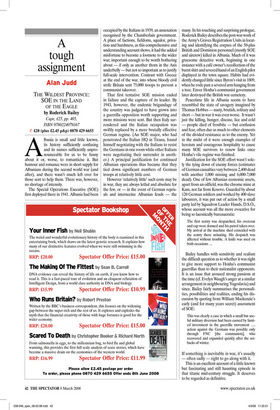A tough assignment
Alan Judd
THE WILDEST PROVINCE: SOE IN THE LAND OF THE EAGLE by Roderick Bailey Cape, £25, pp. 405, ISBN 9780224079167 ✆ £20 (plus £2.45 p&p) 0870 429 6655 Albania is small and little known, its history sufficiently confusing and its names sufficiently unpronounceable for us to be funny about it or, worse, to romanticise it. But humour and romance were in short supply for Albanians during the second world war (and after), and there wasn’t much left over for those sent to help them. There was, however, no shortage of intensity.
The Special Operations Executive (SOE) first deployed there in 1941. Albania had been occupied by the Italians in 1939, an annexation recognised by the Chamberlain government. A place of factions, fiefdoms, squalor, privation and harshness, as this comprehensive and understanding account shows, it had the added misfortune to become a footnote to the wider war; important enough to be worth bothering about — if only as another thorn in the Axis underbelly — but not so important as to justify full-scale intervention. Contrast with Greece at the end of the war, into whose bloody civil strife Britain sent 75,000 troops to prevent a communist takeover.
That first tentative SOE mission ended in failure and the capture of its leader. By 1943, however, the endemic brigandage of the country was judged to have grown into a guerrilla opposition worth supporting and more missions were sent. But then Italy surrendered and the Italian occupation was swiftly replaced by a more brutally effective German regime. (An SOE major, who had penetrated the Italian HQ in Tirana, found himself negotiating with the Italians to resist the Germans in one room while other Italians were negotiating their surrender in another.) A principal justification for continued Albanian operations thus became that they tied down significant numbers of German troops at relatively little cost.
However ‘relatively little’ such costs may be in war, they are always lethal and absolute for the few, or — in the event of German reprisals and internecine Albanian feuds — the many. In his touching and surprising prologue, Roderick Bailey describes the post-war work of the Army’s Graves Registration Units in locating and identifying the corpses of the 50-plus British and Dominion personnel (mostly SOE and aircrew) killed in Albania. Much of it was gruesome detective work, beginning in one instance with a café owner’s recollection of the burnt shirt and severed hand of an English pilot displayed in the town square. Habits had evidently changed little since Byron’s visit in 1809, when he rode past a severed arm hanging from a tree. Enver Hoxha’s communist government later destroyed the British war cemetery.
Peacetime life in Albania seems to have resembled the state of savagery imagined by Thomas Hobbes — nasty, brutish, solitary and short — but in war it was even worse. It wasn’t just the killing, hunger, disease, lice and cold — people died of frostbite — but confusion and fear, often due as much to other elements of the divided resistance as to the enemy. Yet in the midst of it were enough examples of heroism and courageous hospitality to cause many SOE survivors to renew links once Hoxha’s vile regime was finished.
Justification for the SOE effort wasn’t solely the tying down of enemy forces (estimates of German casualties vary between 2,400 dead with another 1,000 missing and 6,000-7,000 dead). One of few Albanian economic assets, apart from an oilfield, was the chrome mine at Kam, not far from Kosovo. Guarded by about 120 German soldiers and worked by 400 slave labourers, it was put out of action by a small party led by Squadron Leader Hands, D.S.O., whose account was all the more evocative for being so laconically bureaucratic:
The first sentry was despatched, his overcoat and cap were donned and his patrol taken over. My arrival at the machine shed coincided with the sentry there urinating. His despatch was affected without trouble. A knife was used on both occasions ...
Bailey handles with sensitivity and realism the difficult question as to whether it was right to give more support to Hoxha’s communist guerrillas than to their nationalist opponents. It is an issue that aroused strong passions at the time (cf. Evelyn Waugh’s anger at a similar arrangement in neighbouring Yugoslavia) and since. Bailey fairly summarises the personalities, possibilities and realities, ending his discussion by quoting from William Mackenzie’s early (and for many years secret) assessment of SOE:
This was clearly a case in which a small but useful military diversion had been earned by limited investment in the guerrilla movement .... action against the Germans was possible only through FNC [the communists], who recovered and expanded quickly after the setbacks of winter.
If something is inevitable in war, it’s usually — often sadly — right to go along with it.
This is an excellent account of a little known but fascinating and still haunting episode in that titanic mid-century struggle. It deserves to be regarded as definitive.


















































































 Previous page
Previous page